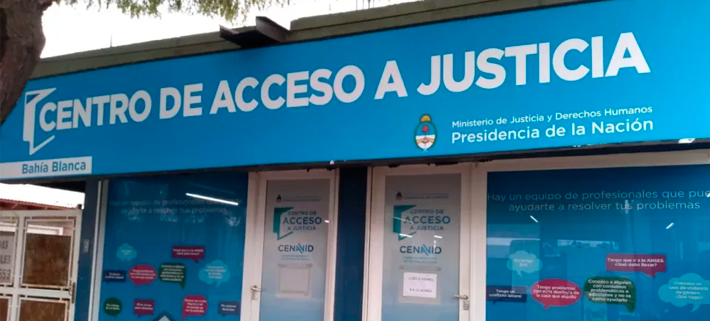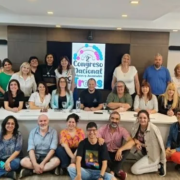Serious setback in access to justice: they order the closure of 81 care centers throughout the country
Yesterday, June 10, a resolution from the Ministry of Justice was published in the Official Gazette ordering the dissolution of 81 Access to Justice Centers. In this way, there will be only one Center per province and remote care will be privileged, which dismantles a primary legal care system linked to decentralizing and breaking down the geographical barriers that the most vulnerable people face when accessing justice. Civil society organizations and different people and institutions committed to access to justice agree on the loss that the reduction of this service means.
“Below, we offer a google translate version of the original article in Spanish. This translation may not be accurate but serves as a general presentation of the article. For more accurate information, please switch to the Spanish version of the website. In addition, feel free to directly contact in English the person mentioned at the bottom of this article with regards to this topic”.
For 15 years, the Access to Justice Centers (CAJ) have been extended as a federal policy throughout the country that brings answers to all citizens, but particularly to the most vulnerable groups in society. The focus is precisely on popular neighborhoods and/or rural areas, places that historically have had greater barriers to accessing their rights. CAJs are devices that provide primary legal care: it is about providing services that specifically address the daily legal needs of vulnerable communities: access to personal documentation, advice on family or work issues, assistance to crime victims, among others. issues. It is the first line of care, located in the territories, that allows removing historical barriers linked to the distance between those most vulnerable people and the state responses they require.
The traditional institutions of the justice sector do not deal – or arrive very late, in a fragmented manner and through long, rigid, winding, expensive and generally ineffective paths – to provide answers to many of the problems that communities face. Faced with this, having decentralized centers, with a territorial approach, that can fully accompany people in resolving the needs they experience is essential.
According to data from the Ministry’s own website, from 2016 to 2022, the Access to Justice Centers attended more than 1,300,000 queries.
What is the current situation of the CAJs?
According to official information from the Ministry of Justice provided in response to a request for access to information made by the Civil Association for Equality and Justice (ACIJ), six Centers had been closed so far this year (going from 109 to 103 ). However, today, a resolution from the Ministry of Justice was published in the Official Gazette that resolves that there will be only one Center per province and remote care will be privileged, which violates a first principle of primary legal care linked to decentralize and break down the geographical barriers that people face. At the same time, it does not take into account the need for support that the most vulnerable people face or the technological barriers.
The cost of Access to Justice
Simultaneously with the announcement of the Official Gazette, the Executive Branch issued a statement that ignores, on the one hand, the most basic premises of access to justice and, on the other, some obvious facts such as that in Argentina there has been no Ombudsman for a long time. 15 years or that the Crime Victim Assistance Centers (CENAVID) operate precisely in the CAJ or remotely through telephone service.
In the same statement, reference is made to the cost that this policy has for the country. The first thing to say is that it is not possible to verify the figure of 8 billion pesos that the Ministry of Justice mentions regarding the cost of maintaining the CAJs. However, it is necessary to highlight that, if that were the correct number, it would correspond to only 0.01% of public spending. In comparative terms, it is equivalent, for example, to 8% of the tax benefits granted to the Mercado Libre company in 2023 or 0.18% of what Argentina has paid in external debt services so far.
At the same time, it is important to highlight that the use of the law by people in situations of greater vulnerability and early attention and resolution
of legal consultations and conflicts result in better economic results in general, avoiding the loss of resources and the aggravation and escalation of the problems they face. Investment in Access to Justice ends up reducing State expenses. Currently, international organizations such as the OECD encourage the implementation of this type of device, in part, with arguments of this type.
Concern about the current situation is transversal. Civil society organizations and different people and institutions committed to access to justice agree on the loss that the reduction of this service means. In the current situation of socioeconomic crisis, these territorial and people-centered policies are a fundamental instrument for effective access to justice.
FIRMS
- ACIJ – Asociación Civil por la Igualdad y la Justicia
- ELA – Equipo Latinoamericano de Justicia y Género
- INECIP – Instituto de Estudios Comparados en Ciencias Penales y Sociales
- CELS – Centro de Estudios Legales y Sociales
- Fundeps
- Capibara
- Xumek
- RAAC – Red Argentina de Abogacía Comunitaria
- Curas Villeros
- Andhes – Abogados y Abogadas del Noroeste Argentino en derechos humanos y
estudios sociales. - Observatorio de justicia sanitaria y climática
About access to justice
Access to justice is an internationally recognized human right and is also considered instrumental, that is, it allows access to others rights. It includes guaranteeing the effectiveness of the rights of all people, which includes not only being able to access judicial actions but not finding non-judicial, administrative and alternative responses to conflicts that affect people’s daily lives.






